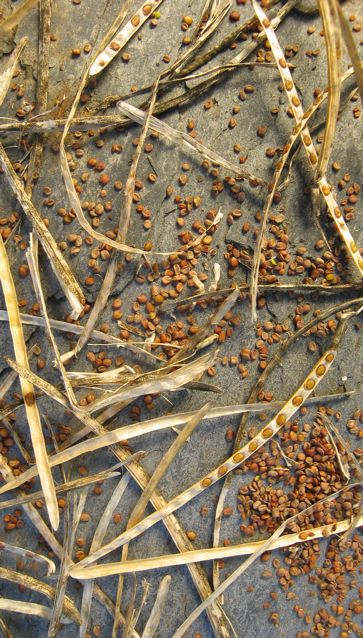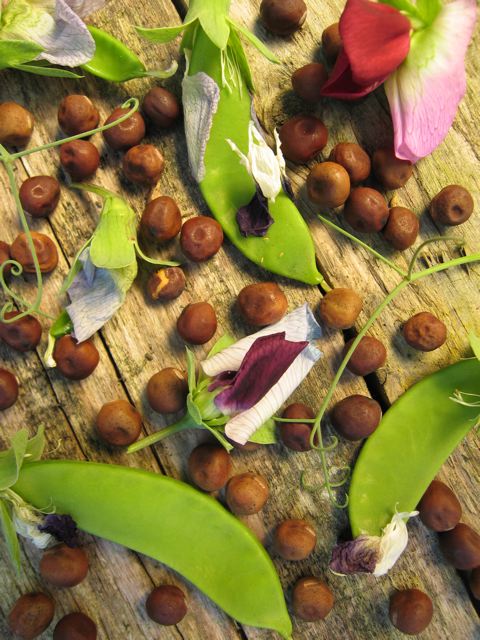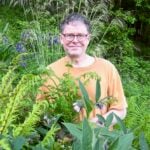Back in the 21st century, food security was taken out of our hands, and all but destroyed. But our keepers haven’t just saved seeds and knowledge – they’ve saved hope.
As he peered over the edge, Noah’s long golden curls floated on a warm, skyward breeze smelling all at once of cabbages, beans and onions. Among these powerful scents, he could just make out carrots, parsnips, and his favourite, peas. Although it was officially off limits, the top of the old quarry was his favourite spot. He still had lots to learn, and even more to remember, and found this the perfect spot to set about memorising the teachings; if you’re going to remember everything there is to know about breeding vegetables, why not learn them by smell as well?
It wasn’t just smells he was getting good at; he’d come top at identifying crops by their seeds alone – and blindfolded at that – even learning to tell broad bean varieties by their seeds. His mentor Lucasz, peering through the long white hair draping his dark, sun-aged face, said that he was just showing off. “Remembering what the parents of ‘Ryton Bronze’ are, and where we grow them, is the important thing, Noah, not telling it from its seed.” Even so, Lucasz did think how useful it could be if the seed harvesters got a batch muddled up. Having no written records, apart from the name of each variety, was safer, and hack-proof, but relying on memory alone made life difficult at times.

‘Ryton Bronze’ was just one of the broad beans they used to grow and keep at the Heritage Seed Library. Noah had heard its story the week before. It had been bred in the second half of the 21st century to help boost the numbers of wild bees, which were still declining after the ‘great poisoning’ by the ’noids. Eventually, the ’noids found their way into the water, the soil, the rivers, lakes and oceans. Nowhere escaped the pollution, and insects of all types suffered the most. Tiny amounts of the old insecticide, which hid in sap, pollen and nectar, slowly poisoned them.
Lucasz was one of the keepers who brought ‘Ryton Bronze’ about by crossing the purple-flowered broad bean with a plant with tiny, bright orange flowers found by chance on a northern allotment. Lucasz sweated out four ‘severity class’ summers selecting the resulting offspring – broad beans with flowers (and beans) in rainbow shades no one had ever seen before. He spent searing hours each day watching and memorising the insects which visited them, especially the hard-pressed solitary bees (domestic honey bees were long extinct). The new plants with their small, bronze flowers enraptured the wild bees; finally they could reach the nectar which their big bumbling cousins had to cheat from varieties with black and white flowers. Their dark and delicious fresh beans cooked up a treat.
Noah swung his tanned legs in the warm, dusty air, which carried voices up from the quarry below. On each of the wide ledges snaking around the quarry sides, people were busy threshing and sieving seeds, the dry ascending air making it a perfect seed cleaning day. He eventually spotted Ambra through a pale cloud rising from a small, laughing group thrashing big yellow dry stalks (cabbages, probably) against the blue rock. She always wore a red mask for the dust. As midday approached, a huge curving mesh of woven willow, on which live honeysuckle grew, was winched higher, casting its dappled shade over those working below. Even at night the rock walls radiated heat, gently drying the thousands of pods and seed-heads strung out along them.
Beyond the quarry, Noah saw rounded drifts of green and bronze in the forest clearings, hazed by the heat of the sun, buzzards wheeling lazily overhead. ‘Ryton Bronze’ was being grown all over the country now, and bee numbers were slowly rising. This winter he and others would take seeds, and logs filled with bee nests, to the east, where wild bees were scarce and crop pollination was still difficult. They would return laden with promising new varieties bred by seed keepers in the east, their parentage cached only in memory.
It was the Plant Gene Protection Act which had changed things forever. Noah had learned, in his sessions on gene history, how the government devised – and eventually enshrined – legislation giving the state the power to ‘collect and protect the entire known gene pool of all commercially or privately cultivated crops’. This meant that the gene collectors could turn up at anyone’s garden or allotment, smallholding or market garden, and seize both seeds and any records, notebooks or digital files a grower might have. Looking through the news coverage of the time, Noah read how this was portrayed as ‘safeguarding future food security for all’, and how the government’s ‘nominated seed protectors’ would then bid to take control of our beetroots, spinaches and squashes, and develop them ‘in line with commercial goals that serve and complement the food industry’. Once a variety had been assimilated into the gene register, you needed a license to grow it, which only a government-approved ‘foodfuture’ company could get.

Despite all the protests, the Act went through. Everyone who cared knew that fighting it would only buy them time to plan ahead. When the ‘gene police’ eventually arrived at the Heritage Seed Library, they found the seed store empty, and all the records gone. Asked about what they’d been growing, the few gardeners left looked puzzled, saying that they couldn’t remember. Wherever the gene police went, it was the same, in back gardens, on allotments and so forth. They raided potting sheds and took away tablets and hard drives, but they found no trace of any seeds, or of their origins – some of which reached back centuries.
The Act had tried to cover everything, but it couldn’t counter willful forgetfulness. Noah’s grandmother, who they called ‘the pea lady’, who had guarded old varieties all her life, became an amnesiac overnight. It was from her that Noah had inherited his own remarkable memory, and why he was now being entrusted, alongside others, with the knowledge of a seed keeper. Peas were also Noah’s thing; he was already called ‘pea boy’, much to Lucasz’s irritation. “If you remember everything about peas you’ll forget about something else.”
“Noah! Come on down, it’s time.” He knew Lucasz well enough to sense the urgency in the command echoing around the quarry. Ambra looked up and waved as Noah began to descend the inch-thick honeysuckle vines. This was to be the first time he would attend a meeting with the big growers. The senior keepers had been reluctant to work with the large-scale growers, but they had known the time would come. Lucasz had explained how the genes in the big crops were failing, and how even modification and using beebots couldn’t help; pests and diseases had eventually overcome all attempts to outwit them, and yields were falling. With their own gene banks exhausted – the ones they’d ‘protected’ all those years ago – they now needed the seed keepers’ help.
“You should come down the proper way, Noah. A dead memory’s no good to anyone.” Noah brushed faded honeysuckle flowers from his hair as they set off through the forest. As they passed a small field of broad beans, their bronze flowers fizzing with bees, they stopped, and each drew in a deep breath of the sweet-scented air.
Text and images © John Walker


